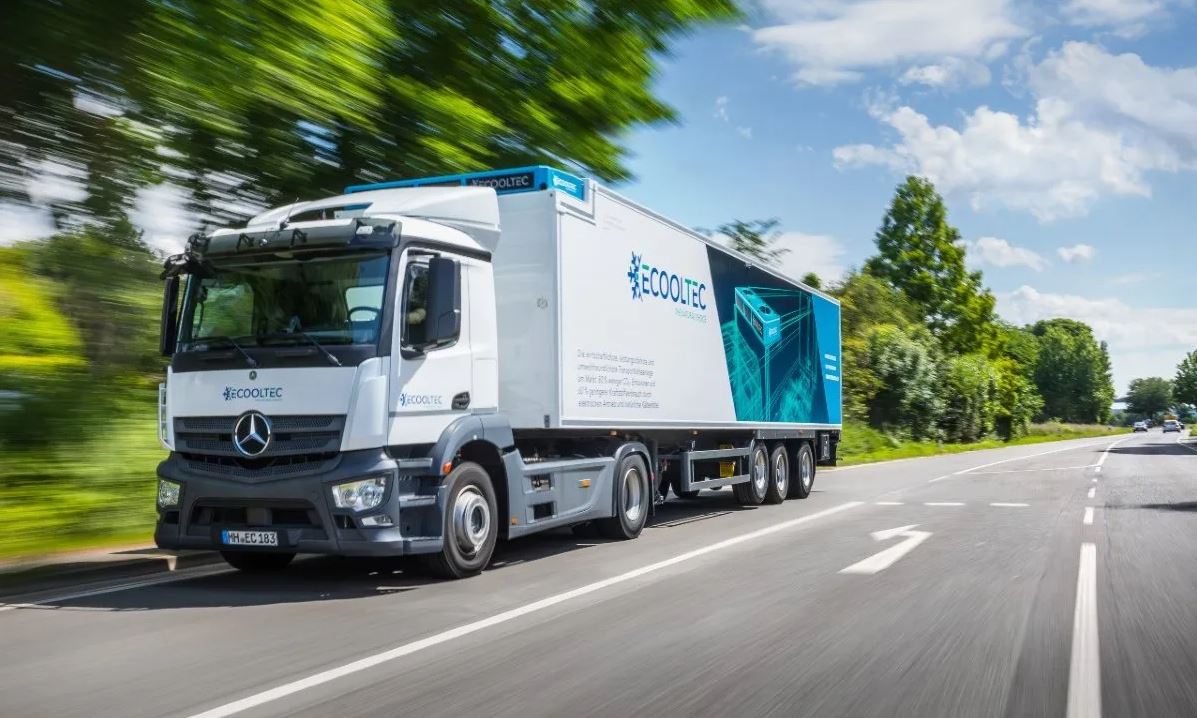ECOOLTEC rolls out its hydrocarbon-based electric transport refrigeration unit in Europe
April 26, 2023

German transport refrigeration specialist ECOOLTEC Grosskopf has begun the rollout of its propene (R1270)-based TM182 electric refrigeration unit for trucks, with a “significant number” of units now installed in Europe following successful initial tests, it said in a recent statement.
Customers include a food wholesale company in southern Germany, which installed TM182 units in its vehicles in combination with the ECOOLTEC E1221 evaporator, it added.
“Since the beginning of the year, many units have already been in practical use in customer fleets,” explained ECOOLTEC. “The initial feedback is positive. [The unit] reliably maintains temperature level, [and] the drivers praise it [for] the very low noise level in the cabin, [which is] a great advantage during deliveries in the early morning hours.”
‘Unrivalled efficiency’
The unit runs on electricity, which can be sourced from the truck’s engine via an in-house, high-performance alternator, a battery or a separate power generator. When in battery operation, the TM182 doesn’t produce any local pollutant or CO2 emissions, reducing emissions by up to 98% via the alternator drive, said ECOOLTEC.
Thanks to the use of natural refrigerants and heat exchangers with a large surface area, as well as high air-flow rate, ECOOLTEC’s transport refrigeration unit also offers “unrivalled efficiency,” using 60–80% less energy than a conventional diesel-powered system, it said.
Efficiency is also boosted with the use of variable-speed control.
The unit provides significant cooling capacity to meet the “demanding” requirements of food distribution, including high load volumes, low temperatures and frequent door openings, said ECOOLTEC.
In addition to cooling, the TM182 unit also offers freezing, defrosting and heating capability, it added.
Maximum safety
With a focus on “maximum operational safety,” ECOOLTEC’s TM182 uses a low charge of propene as the primary refrigerant, together with CO2 (R744) in the secondary circuit inside the body of the truck. The two circuits are connected via a braze plate heat exchanger.
To reduce the risk of leakage, the propene is contained in a fully hermetic circuit, and the refrigeration process occurs outside the cargo hold. According to the manufacturer, with this set up, there is “no risk of forming a flammable atmosphere.”
In the unlikely event of a leak, the R1270 immediately mixes with the ambient air and evaporates, it added.
Compared to conventional transport refrigeration systems, ECOOLTEC has said that its unit reduces the refrigerant charge by around 90%.
F-gas-free cold chains
According to ECOOLTEC, high-GWP F-gases are still commonly used in refrigerated transport, which is “slowing down the reduction of greenhouse gas emissions” within the sector. The company attributed a significant portion of this to refrigerant leaks due to an absence of fully hermetic circuits.
The use of F-gases in transport refrigeration units is also increasing operation costs due to rising refrigerant prices and limiting the operational life of equipment due to regulations.
However, natural refrigerants are future proof, said the company.
“ECOOLTEC has proven that the use of natural refrigerants in transport refrigeration is possible and made available today,” it added. “All operators of refrigerated vehicles can contribute to a completely F-gas-free cold chain.”


